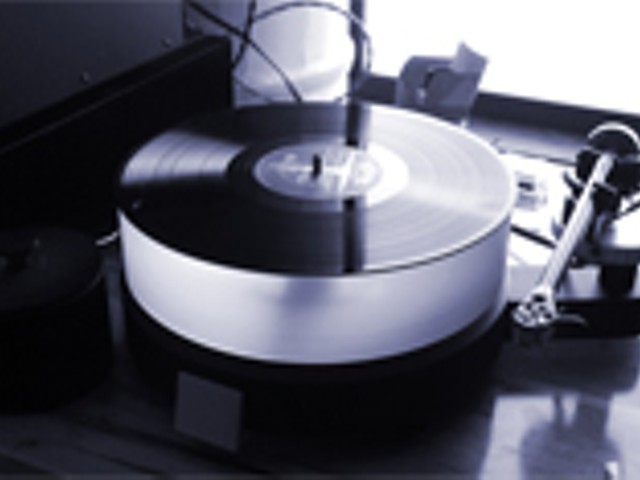Mastering is the key process to the final sound of a recording. It’s where the mixed master from the recording session is technically fine tuned (through equalization adjustments, sound compression, signal leveling, editing, restoration and blah, blah, blah) for listening on vinyl, CD or any other format. In short, pretty much every commercial recording you own has been mastered. And there’s a real art to it.
This Steve Hoffman guy is, um, a master at mastering, one of a few in the world. His versions — always from original master tapes — are the definitive ones, from the recent Red Hot Chili Peppers’ heavy vinyl pressing of Stadium Arcadium (Warner Brothers) to the Faces’ A Nod is as Good as a Wink CD (Audio Fidelity) to the Sonny Clark Trio SACD (Audio Fidelity) to the out-of-print McCartney CD (DCC).
His is an ability to identify warmth — the tonal, ambient and rhythmic — in prerecorded music and present it in such a way that’s totally involving, while not fucking with the integrity of the recording. His masterings are popular among audiophiles, artists and other engineers.
His online audiophile forum, stevehoffman.tv, is growing quickly. Its informed members chime in on myriad musical subjects, including "mastering" engineers whose final touches ruin "remastered" reissues. They can get crucified in some of the site’s threads. Nitpicky? Sure. But if one gives a damn about music and how it sounds, albums and discs faithful to the original master tapes are essential.
And if modern recordings are a difficult listen, if the sound leaves you fatigued, blame can often be placed on a mastering engineer for jacking up the volume and applying other "enhancements" that squash the dynamic range of the music and kill the feeling. —Brian Smith
Metro Times: What’s your biggest complaint about modern mastering techniques?
Steve Hoffman: The music is mastered too loud. The engineers and producers are so concerned with their release being as loud as possible they forget that in order for something to actually sound loud it has to have some quiet parts in it! "All loud all the time" basically has the effect of making everything sound quiet.
MT: What makes a well-mastered disc?
Hoffman: When the music (doesn’t matter what kind) has some "breath of life" as I call it. In other words, if, when you play the music your ears might accept it as actually happening instead of a mere recording of something. Dynamics and fidelity come first. Your ears want to hear something that sounds lifelike no matter what the type of music. From birth you have been unconsciously taught to survive by using your wits, eyes and ears. Your ears need to be able to tell you if there is danger, the sound of a friendly voice or whatever. We are "tuned" to this whether we realize it or not. Well, when we hear music we struggle to make sense of it; is it happening in a real space, etc. When we can put a mental "picture" to the music we can enjoy it better. It’s hard to do this with purely electronic music, but we are getting so used to that sound now (after years of synths, Star Wars, etc.) that it’s becoming a reality just like a violin. We do strive to makes sense of noise though, and the more dynamic something is (even if it’s a sound that does not occur in nature) the more our ears can accept it as "fact" instead of fiction. That helps.
Remember, our ears are pretty smart.
We can recognize a voice over a really tinny cell phone speaker, so it’s not about total fidelity. It’s about the idea that the more lifelike something sounds, the better we can enjoy it. You can be walking on a street and hear inside a club some music playing and you will know instantly if there is a live band in there or not. I’m sure we’ve all experienced that. We are nowhere near the band, but even from a block away we know it’s live. It has certain musical and sound "cues" that clue our brain to the excitement of live music.
Dynamics have a lot to do with it. When a drum set is being played, the cymbal vibrates at a different frequency than the snare drum and at a different volume. When our recorded music faithfully reproduces this, we can be "fooled" into thinking that it’s actually happening. That always makes the listening experience better.
Also, when people are all playing together in a room, the sound is bouncing off the walls, ceiling, etc. and this all hits our ears at different times. When this can be reproduced on a CD or album, it’s all the better for us. Close micing techniques of most modern music can really spoil this illusion. Think about it; no one listens to a hi-hat cymbal on a drum kit from one inch away from it. Well, that is where the microphone is! If the engineer moved the microphone back about two feet the sound of the hi-hat would mingle with the sound of the rest of the kit and the room and (like a good sauce in cooking) everything would simmer together better.
MT: So far your work seems mostly appreciated by audiophiles and artists and not many others. If more people heard this kind of presentation on a decent system, there’d be many more sets of ears into hearing music as it was intended to be heard by the original producer and artist. Do you agree?
Hoffman: I would like to think that this is true, but my real life experiences have shown that people, 99 percent of the time, think that louder is better and that any music with natural dynamics in it (loud parts and soft parts) is somehow "flawed." Sad but true.
MT: Musicians, songwriters, producers, audiophiles and those keyed into the actual dynamic integrity of music seem to be drawn in by something other than performance and the quality of overall sound. There is something deeper. Engineers and producers in the ’50s and ’60s understood this "mysterious" element. You understand this "mysterious" element. What the hell is it? And where did it go?
Hoffman: Spontaneity. I mean, musicians playing together in the same room without headphones or studio isolation panels has a lot to do with it. When "multi-tracking" came in the late 1960s (I mean 16-track, etc.), we lost that in our mad rush to have total control over the final mix. In the good old days, feel was what mattered. That is totally lost now, I’m sorry to say.
MT: Everything you’ve mastered has a real-world, life-like quality. Do you have any theory about how certain tones or rhythms can affect a person’s overall well-being? Or how certain sounds and tones lead to emotional responses?
Hoffman: I have found this to be true: The better mastered the music, the better it can make you feel. After doing this for 25 years, I can state that this is so! Yes, certain "tones" strike a chord (pun) with us and lead us down a path of actual healing. I actually invented a CD called The Healing Disc that has nothing but tonal vibrations on it manipulated in such as way as to stimulate your own body’s healing force. This enhances your body’s innate healing ability because it is my belief that all life systems have their own rhythmic balance. Music and the tones inherent in the music seem to make the mind and body become "as one" as they say. I’ve always found this to be true but was quite surprised that the musical tones themselves without any semblance of "order" can work on their own. However, our minds need emotional responses as well, and music has fit that bill for hundreds and hundreds of years. One can find music that will make you happy, sad, thoughtful, etc. These emotional responses translate into physical ones as well. It’s very rewarding when someone writes me and tells me that something I have worked on has made them cry or laugh out loud. I am doing my job when that happens.
MT: You do all your actual mastering work in analog right? No dumping to hard-drives.
Hoffman: I dislike the sound of digital work stations. If I am working with an analog tape, I will keep it in the analog domain until the final "dump" to the digital master. This means that all my mastering "moves" (fades, EQ, balances, etc.) are done in real time, live in true analog. I try to keep the good analog sound until the very last minute.
MT: For personal listening, do have any format preference — vinyl, CD, SACD or DVD-A? Can you explain for the reader what you like and dislike about each?
Hoffman: Vinyl is neat, very lifelike-sounding, and I love to watch the label going around (old-school). An important feature of good vinyl mastering is that there are rules for mastering; you cannot go crazy and add too much treble or the needle will jump right out of the groove, and you cannot add too much bass or the needle will jump out of the groove and the record will be over in three minutes. So engineers (even the deaf ones) have to follow the rules and most LPs sound good.
CDs are neat as well. The good ones sound really good; the bad ones sound really terrible though, with much wider variance than vinyl because there are no rules in mastering; you can add as much screechy treble or pumping bass as you want. Not my favorite.
SACDs are nice but no Beatles, Led Zep, etc., so pointless for me.
I’m not really into surround sound so DVD-A leaves me a bit cold. I dislike having music playing behind me like I’m sitting in the middle of the band or something. This is not anything that would ever occur in real life unless you were the bass player or something.
MT: We live in a culture with myriad downtime distractions. So sitting down and actually listening to albums in a real participatory way is all but an archaic activity. It’s like some people enjoy wholesome home-cooked meals while others prefer the Burger King drive-thru. The magic of music — in that powerful, life-changing sense — might be lost in our culture. It’s but aural wallpaper, a soundtrack to other activities. If you had one piece of advice to someone who wants to broaden their listening from, say, downloaded MP3s on an iPod to a more dynamic, musical experience, what would it be?
Hoffman: Take the buds out of your ears, get a real (modest) stereo system for your room or house and devote at least a half-hour a day to real listening. Sit still and focus on the music alone. It might change your life!
MT: Through your Web site, many have been converted to, for lack of a better word, "audiophiles," or have a better understanding of how sound and music work. Was that part of your plan when you set the site up?
Hoffman: Actually, it was. Sometimes too much information (like how something was recorded, etc.) spoils it for the casual listener but most times, they gain a new understanding and awareness of the recording process and therefore can appreciate the music even more. That tickles me!
For more info on Steve Hoffman, go to Stevehoffman.tv or purehealingsound.com. Also, view a short video on how mastering loudness ruins recordings. Brian Smith is the features editor of Metro Times. Send comments to [email protected].




